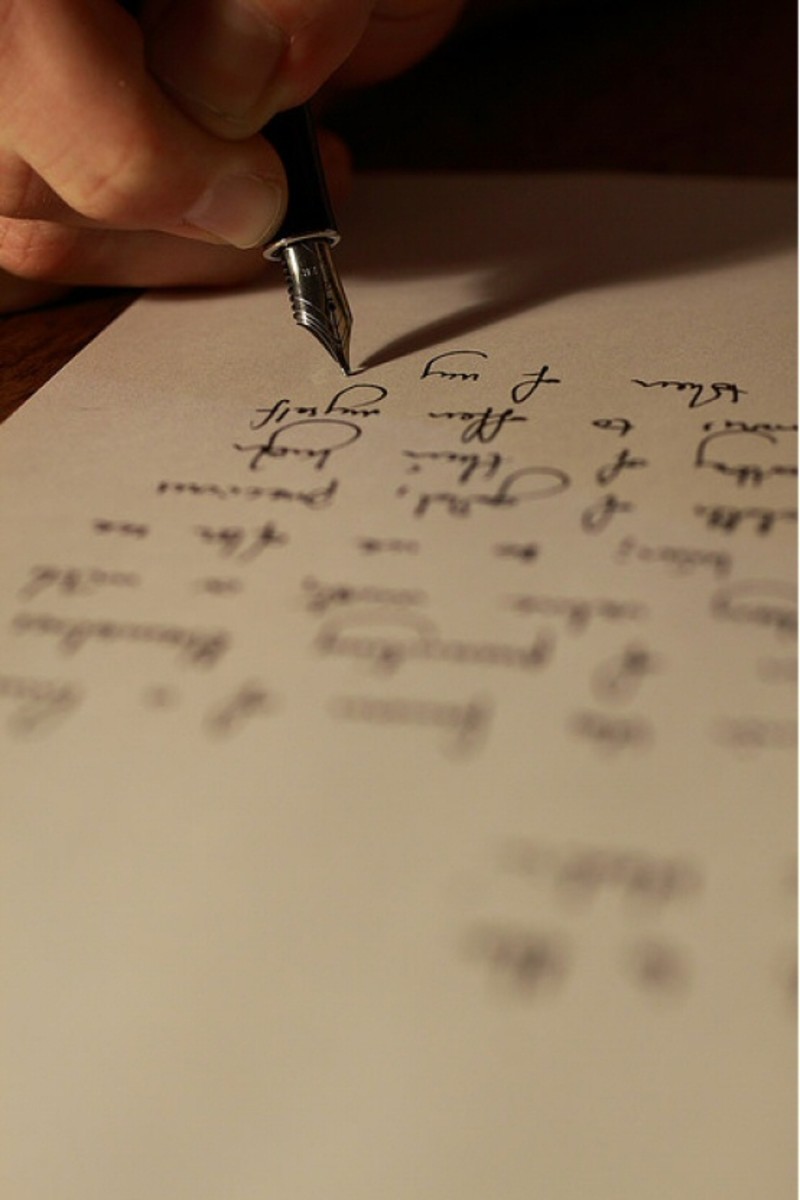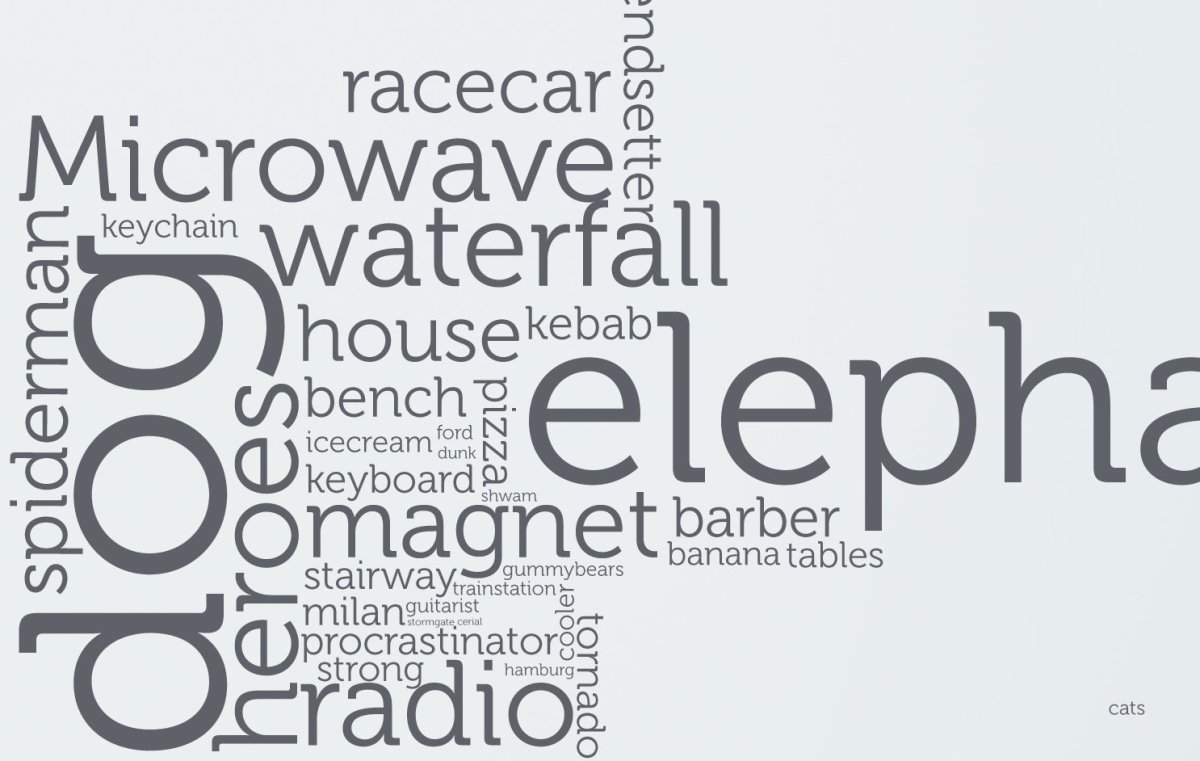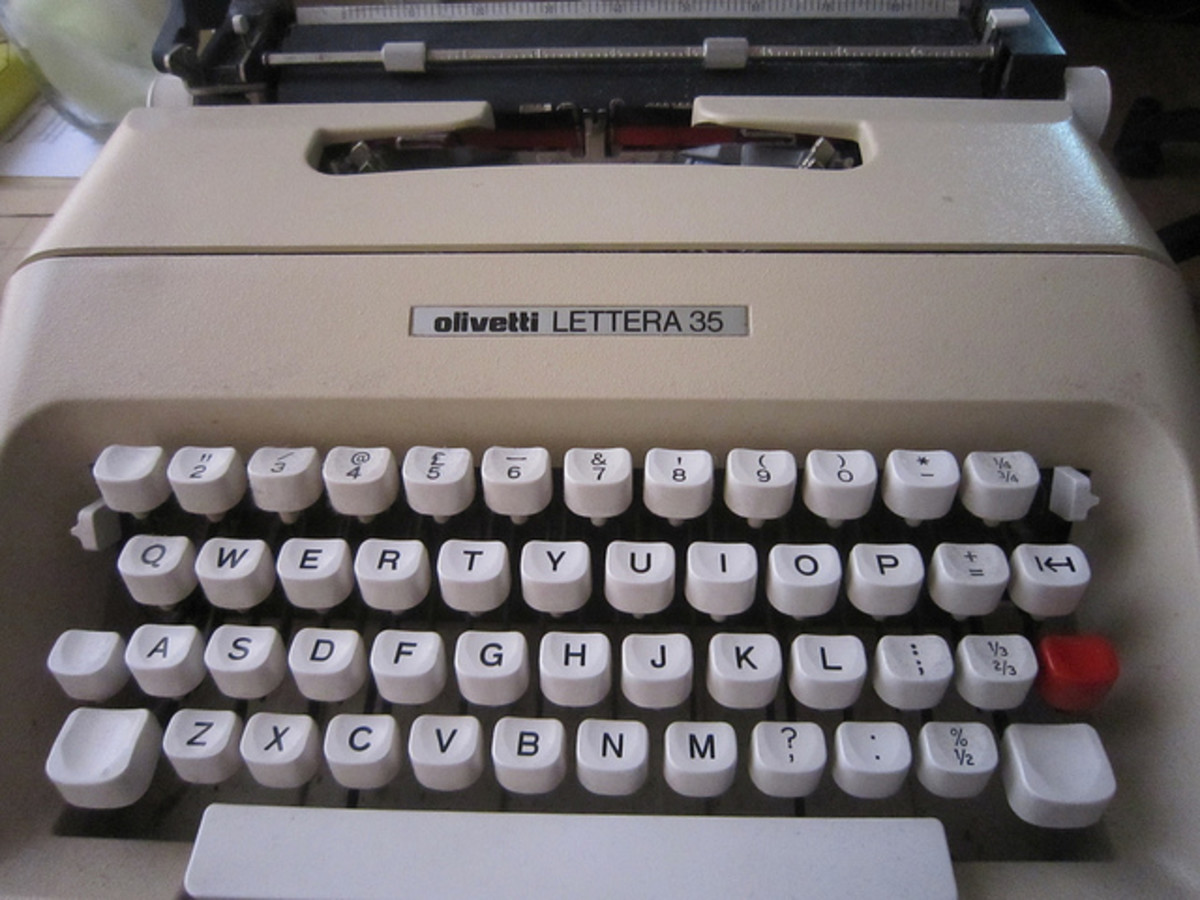Five Tips for Speed Writing
#2 of 100
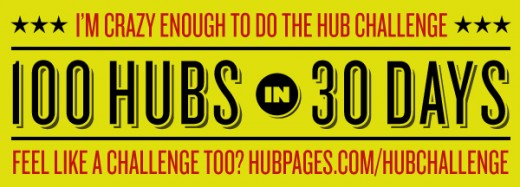
Tip #1 -- Don't Stop!
You don't need to be an insanely fast typist, but it helps. Speed writing for fiction marathons like http://www.nanowrimo.org or the http://www.3daynovel.com contest can be broken down into much easier, smaller sections -- chapters, scenes, pages of script. Focus on the one at hand and just don't stop working on it.
When you run out of good things to say, pad -- just get it down any old way -- keep going even if you think it's tripe and the worst thing you've ever created in your life.
The reason I did not phrase this as "let yourself write tripe" is simple:
You can't tell if you're writing tripe or not.
It feels exactly the same whether you're doing the worst garbage you ever wrote or the very best wonderful gem of prose you've created in your entire life. Both statements may actually be true about the same section of writing by context. That piece of brilliant gemlike prose may be way overdone -- until you pull the snap that puts it into context and makes it the buildup for something snappy. That extraneous bit of dialogue may have a plot point hinging on it.
The way to go with organic linear writing is to just not stop and accept whatever flows. That is why they call it a Rough Draft. It can be rough. It can be sloppy. It gets it down where you can look at what you have and decide to clean it up -- the cleanup could mean throwing away the most beautiful bit of prose poetry you ever created because it's not relevant to the plot.
I tend to save those in side files because they do make good prompts and starting points for related stories. Very often glorious writing happens on a tangent. Why waste it if you're in love with your own words? But that's an editing trick.
The speed writing trick is to accept everything and don't stop writing. Someone who manages 200 words an hour steady is going to accomplish a challenge better than someone who soars and bangs out 3,000 words in an hour -- and then gets stuck for a week moping because they don't know what happens next. If you don't know what to put next, throw in the first thing you think of and run with it even if it's stupid.
Chances are it's not. Chances are your unconscious knows exactly when to come up with a change of scene and tying all these unrelated mosaic bits together will happen like watching a frost fern form -- they are all coming up out of you. You can't help being yourself and liking the things you do. They will tie together. They may need a little rearranging later on, but you're doing Wrimo or whatever on word count anyway!
So just don't stop.
Try a Faster Keyboard Layout -- Dvorak
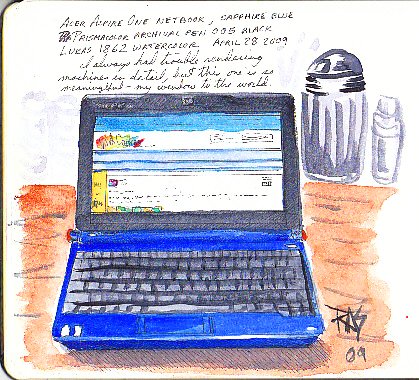
Switch to the Dvorak Keyboard A Year Before The Challenge
Do not try to switch your keyboard layout before the challenge unless you have at least three months to get used to it, or you're using the challenge to get used to Dvorak instead of using Dvorak to win the challenge. You will do better on the challenge the year after you learn to use the Dvorak keyboard layout.
Dvorak is an alternative keyboard layout that's more ergonomic. The original qwertyuiop layout was literally designed to slow typists down and became the standard on physical typewriters that had a tendency to jam when people got past about 60 or 70 words a minute. Some of the first typists were banging away at over 100 words a minute with practice and that was more than those original machines could take. It became standard.
It also causes a lot of repetitive motion injuries that can be avoided by switching to Dvorak. I made the change because I started getting sore wrists. I was terrified that writing, which is the only thing I ever wanted to do with my life, would become impossible or need to be curtailed to reasonable hours like regular people. I like typing and writing 12-18 hours a day. I live online. That IS my social life, being housebound and disabled.
So I took a challenge to learn it with some other writers in a chat room, which slowed to a hilarious crawl with many obvious typos as we all practiced together. It helps to have some reason to spend a lot of time typing in the new layout every day -- or at least an hour a day. It also helps having a buddy or several going through the same thing.
So making the switch, if you like doing <a href="http://www.nanowrimo.org">Nanowrimo</a> is a fun activity for December after you finish your novel, a way to stay in touch with friends you made during the marathon. Write short emails. Write in chat rooms with buds. Write things that don't matter and chunks of personal journal.
Google on Dvorak Keyboard Layout and you'll find lots of great tutorials, games, printable keyboard layouts. You can toggle Windows to change to Dvorak -- it comes under languages and is in the advanced tab under that, I think. It's always a little tricky finding my way back to it, but once I do, a little keyboard icon appears on the task bar to let me switch back and forth so that if my daughter needs to troubleshoot Windows, she can switch back to what the keys are labeled for.
If you use a regular keyboard with pop-off keys, you can rearrange them to Dvorak too and that makes it easier. On laptops I got used to not looking at the keys mostly because they don't match what I'm using! So I have to deliberately not look while typing passwords, or type them out in a file and paste them in, but it's worth that trouble.
Using the Dvorak layout will help prevent repetitive motion injuries, and on average it raises your typing speed by about 20 words a minute. I think that it raised mine quite a bit more -- I was going at 80 words a minute on Qwerty and while I haven't clocked myself on Dvorak, I know that I'm much more than 20% more productive in terms of pages finished and how many hours a project takes.
It just about doubled. Some of that may well be that typing is so much more physically comfortable with Dvorak that I spend more time at it and stop less -- I may have been stopping with aching hands more often back when I used Qwerty, and no longer need to do so.
Incidentally, even if you don't switch, it may be fun to clock your typing speed before doing a writing marathon and then in December after doing your Wrimo or after Labor Day Weekend is over when you're printing out your Three Day Novel. Practice builds speed. Touch typing is faster than looking at the keyboard, but if you have to learn touch typing in the first place, then it's better to start with Dvorak and never get used to the cumbersome Qwerty standard.
If you want to be able to use both, then spend at least an hour a day on Qwerty while learning Dvorak. It will slow your learning it but you'll retain the old layout much better. I didn't and now hunt and peck on actual typewriters. I actually forgot twenty years of Qwerty practice in just a couple of months, when I started getting to a comfortable half speed on Dvorak it seemed to overwrite the habits that made up typing in my brain. Funny how that works.
Relax

Make Yourself Comfortable
This relates a lot to the first tip about not stopping. If you're comfortable and happy in a chair that doesn't hurt your back, with your favorite beverage handy and any other little snacks or comforts you like, with the music you like going in background and anything else about your writing space that makes you comfortable and feel like writing -- then you won't have so many distractions.
Physical comfort can make a huge difference to a writing marathon, in much the same way that good shoes can make a walking marathon a joy and bad ones scupper it.
Turn off the phone and Instant Messenger during your writing time. Arange your life to allow yourself uninterrupted writing time if you possibly can. That's part of comfort too -- but you may be different. People with ADD sometimes can't focus without multitasking, so if you're unlike me and need to have IM open and the television going and know where the kids are and some To Do list sitting next to you to jot things into -- then by all means do it your way.
Everything important in life, I learned from cats. One of the biggest is that doing things your own way is the very best way to get them done and usually also the most pleasant. Once in a blue moon, unasked advice can prove useful and give you a comfort or benefit that you have literally never tried and find out it works for you.
But more often than not, unasked advice on how to make yourself comfortable turns generic and doesn't take your personal tastes into account. You may actually be happier writing in a bare, stark, clean space with a spotless desk that has nothing on it and no distractions. I know I'd go nuts with all that empty clean space and feel like I was invading someone else's space, feel like I was in a prison, feel deprived, miss my sketches and all the colorful variety of my art supplies and other toys.
Knowing where all my stuff is and having it in reach is what makes me feel comfortable. So indulge every personal security blanket you have to make the whole process pleasant.
Small Rewards Build Good Habits
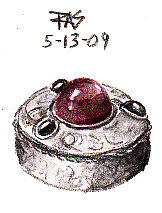
Reward Your Progress Continuously
The sketch above is of a cool little museum replica pillbox that my daughter gave me. I had trouble remembering to take my medication and used to use a seven-day pill reminder box that I got for free from a doctor's office. It had the name of an antidepressant on it, something like Prozac or Zoloft, and while I filled it on time at the start of the week, every time I looked at it, I had a little twinge of resentment and a scare.
My physical disabilities have symptoms that got mistaken for depression and other assorted mental illnesses, they're congenital, so all my life I've been terrified that I could be locked up, lose all my adult civil rights and get drugged into zombie insensibility because I could not keep up physically or be happy while in excruciating physical pain. Hint: if antidepressants never work but taking an acetaminophen lightens it up, you're looking at chronic physical pain. I couldn't tell and still don't know what the body feelings of someone in emotional pain are. I only know that it can be just as severe as anything I go through.
Using the cool Renaissance pillbox was a small ego-reminder that I'm a cool guy. I'm creative. I'm artistic. I'm a Renaissance man who can dabble in science and write about it, dabble in the arts and write about it, read and understand all sorts of different things and write about it. This is an environmental cue that reinforces my personal identity.
So get very personal with your small rewards. Pick a favorite scent and burn that incense or set out that essential oil or air freshener only during writing sessions -- eventually it'll be associated with writing and you can't smell sandalwood without reaching for the keyboard. Always go specific, personal and background like that.
Having specific writing music can help a lot. I found I don't even listen to music unless I'm writing, but if I have music on I'll drift into working on a novel or some articles. If the TV is on or I'm watching a video, then I reach for a sketchbook -- so I have different environmental cues for different creative activities. If you prefer the sound of silence and that helps you write better, then do everything you can to silence your writing time or write in the middle of the night when no one else is up -- so the silence itself is also a reinforcing reward to help create the habit.
Things are easier when they're habits. When you do them by rote they aren't that hard -- especially the things like typing and expressing the words that are running in your head instead of trying to force them to come when you're distracted by other activities. So any habit in background that reinforces it without interfering with the writing is a good one to cultivate.
Any writing marathon is just that -- a marathon. It's long term sustained activity. It triggers the instincts that let human beings run down a deer for three days before catching it. That said, once you develop a good set of outside reward reinforcements to keep yourself moving, marathon writing becomes self rewarding.
My brain generates endorphins from the sustained focus of marathon writing. For a full decade before I got any medication for my chronic pain, chronic pain itself trained me into marathon writing. It started just by journaling when I thought I was depressed -- and feeling better if I journaled for several hours, because I was more focused on telling the story of my life and whining about what went wrong in it than I was on how my body felt and lo, the endorphins ran from the sustained concentration on making myself understood.
Then writing fiction fell into the same category and I forget to journal while working on books. I realized it was just the act of writing for several hours at a stretch that was doing it -- and keeping my mind on it even when I got up for the bathroom or went to the fridge for food.
While pain relief is an obvious reward, endorphins don't just make pains go away. They give active pleasure. By using other rewards to build up the habits and your stamina, you'll reach a point where the writing process itself is a physical, visceral reward.
At that point, sustained practice will also start making you a darn fine writer, since doing something a lot over and over while trying to improve it does always work to improve skills. Learning to enjoy the story you're writing and do it to your own taste is part of the self-reward process. You're doing that Wrimo or Three Day in order to please you.
So write the book you want to read. Write the genre you like best. Be horribly self indulgent -- because chances are, what floats your boat also has a sizable number of readers who share your tastes. You're actually lucky if they're peculiar because then you have a niche market of people who love vampire novels that are about single parents dating sexy vampires in exotic locales that involve ocean voyages... you start throwing in everything you personally like and it goes from generic cliche to strikingly original.
So you can reward yourself even in your choice of topics - and that's as much a key to good writing as it is a method to get yourself to write when you're reluctant.
Turn Your Back On Criticism
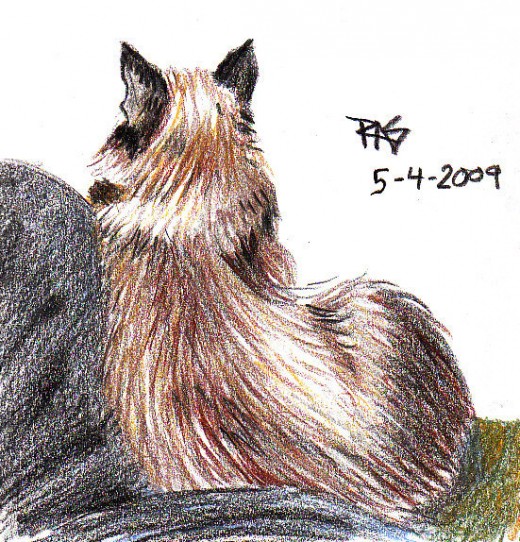
Turn Your Back On Criticism
Criticism falls in two categories. Helpful critique that can improve your writing, and personal criticism that can demoralize you and cramp your style, leaving you feeling shamed and afraid even to try writing anything again let alone something like that vampire on a cruise ship dating a single parent.
Hold your boundaries on both. You don't even have to sort them during the event. Just smile and say "I'll tell you when it's done."
This will also relieve all of your loved ones from the social obligation to wade through your beginner quality writing and force themselves to say "That's nice." Instead, explain the marathon and that real support is for them to cheer when you announce your Word Count. Most people who genuinely care about you can spare a "Yay" and very often an honest "Wow" when the numbers start to rack up.
You're only asking the few seconds of their time it takes to type three letters in an IM. You will get reciprocity if you bang around on the forums and type those three happy letters to anyone else's count and have a big cheering squad coming in on your side to counter the social pressure of personal criticism. Take your phone off the hook. Avoid any negative people.
If your relatives or spouse or coworkers usually criticize you, which they almost always say is for your own good even when they're at their meanest, then shut them down fast by saying that you can't take the time to deal with the distraction. Do not ever talk about the content of the work except in very supportive company -- like the forums for Nanowrimo, especially within the genre forums where the other romance readers who are into single parent novels and sexy vamps are going Whoa, that's such a cool idea" and maybe even suggestions like "Could that cruise be to Jamaica? I always wanted to go there..." Or they actually took a cruise and their anecdote has some detail about the Caribbean or cruise ships you can use in your book.
Don't discuss it onstage, keep all the good backstage goodies backstage with your fellow nervous performers, many of whom have as much stage fright as you do. The more you cheer them on, the more you'll get cheered on. Avoid any other social contact.
Most readers do not want to know how you did it. Chefs are about the only people that like tasting half-cooked sauces and unbaked bread dough to decide what seasoning to add. Readers would much rather, if they ask what it's about, to get the kind of little quick one-sentence blurb they might get in TV Guide about it if it was the Movie of The Week. "Vampire Eric Stone meets the woman of his dreams -- and her three year old brat -- on a cruise to Jamaica."
That's a hook sentence. Practice those. They're fun anyway, they're a good way to consolidate your focus and your starting point. When they say "Cool, I want to read that!" smile enigmatically and take their email, about a quarter of them mean it and can become valuable First Readers later on when the book is done.
They do not know better than you do what ought to happen in the next chapter. They have no idea what twists will come out and their suggestions are more likely to be cliche -- readers especially will mention the genre cliches as if no one ever thought of them before. This is because what they really want is that familiar story retold beautifully, a version of it that's wonderful and is original mostly because of how it's told and its characters and its details.
You're the one thinking of them because you saw a documentary on medieval London and some detail in it caught your eye and so that's where Eric or the idea of Eric came from. That's why you're the writer -- and he's not ready to be introduced till the story's entirely told. They may expect a romance novel but you went writing along merrily getitng realistic about their relationship only to find it's a savagely brutal, tragic horror novel about codependent relationships and abusive men and why they're sexy to women who've been abused before.
You might discover that around the first red-flag warning behavior sign in the middle of the book and realize the scary icky version is better, jump on the roller coaster and write it -- but if you primed them for romance and then switch tracks they're going to get upset. With good reason, they want a happy ending.
There are a host of changes that happen like that, not always so dramatic as to change the genre, but enough that if you listen too much to the feedback too many cooks will ruin the soup. If you let it run with what moves you, the story will be true and authentic and you will have a good time writing it.
You can also keep the freedom to completely change your mind when a natural twist like that shows a better story -- and that's not something a group can come up with anywhere near as easily as an individual writer. You can't help having a strong, original style. You're who you are. You went on vacation where you did, grew up where you did, are the age and gender and religion and all those details that you are, know the best friend you do, had the childhood experiences you did.... everything about you is that unique. Which means that even when you're making it up, your story will be unique.
It will always have originality. Never ever doubt that. If you do, grab an old chestnut like a fairy tale and rewrite that as your novel. I guarantee it will not be the same as Disney's.
What makes a good novel is the skill of storytelling and that comes from practice. What will make you a great writer is giving it the time and attention and practice you need to gain those skills -- and the more skilled you are, the easier it is for any reader to see your original personal style in it. You don't have to try for that at all, just try for keeping the story moving and telling it well. Read good books, the ones you like best, they are influences that will flavor your prose -- and the more variety in them, the less plagiarism is involved.
Try stealing minor characters whose subplots ended in ways you didn't like and give them the ending you wanted, happy or comeuppance. That is one great prompt in itself if you can't think of a starting point -- just remember some character who got an ending you didn't think they deserved, bad or good, and make that one the main character and have it turn out like it should have. That one will always be original.
At no point when I used that for a prompt did anyone ever, ever recognize what the prompt was or who I stole from, usually one of the best. It works best with minor characters but if you change the setting and everything else around the situation, you can pull it off with major characters, like what if Hamlet didn't equivocate? Then you get this vengeance and palace intrigue story that could be tragic or could just be bloody messy drama.
Believe in yourself.
Hang onto that by surrounding yourself with support and shutting out anyone who doesn't believe in you because social pressure is real and affects all human beings. When you write, it's you and the book -- when you write, you have to be unanimous. You're an individual, not a democracy, they don't get a vote on what book you're going to write. But every character in that novel in progress is a lonely ghost crying out to have that story told, sad or happy or dramatic... and only you can ever tell those stories.
So you can believe in yourself for one other good reason. If you take all this advice and write the worst lousiest Mary Sue of a beginner novel with it... the project is not rotten. The book isn't lousy. It's just unfinished.
There are no bad novels, just unfinished ones that got rushed to print before their time. You can always edit it. You can make sweeping changes. You can make successive changes that leave it unrecognizable and the final good novel when you've gained the skills of a professional bears no connection to its earlier stages -- babies don't look like grown men and women either. So welcome the book with the unquestioning happy delight you'd give a new baby or a new kitten and let it grow into what it's going to be without distorting it -- and you will be in the process of writing a brilliant novel right up till the last edit.
Do these marathons annually and youl'l get very good at it with plenty of social rewards for success, starting with your genre readers. But that takes time and practice -- and all five of these tips are intended to make the practice fun enough to keep going.
Enjoy. I'll see you in November or on USA Labor Day if you're brave.


